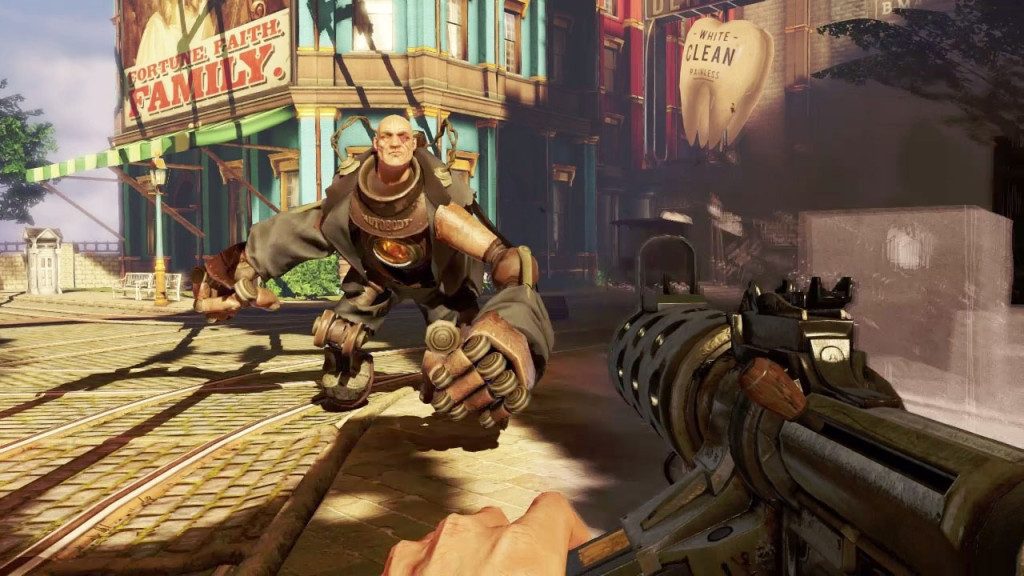Our full look at ‘Bioshock: Infinite’
By Adam Tatelman, Contributor
4/5
Where to start with Bioshock Infinite? Ever since the original System Shock on Windows, the main characters of the Shock series have been their settings, from Hacker pursuing SHODAN through the corridors of the starship “Von Braun” to Jack scavenging the ruins of undersea objectivist utopia Rapture. Although sky city Columbia is a brutal account of early-1900s industrial revolution strife, complete with robber barons, subjugated minority workforces, and beautiful period-accurate architecture that wallows in anachronistic steampunk, Infinite changes the game by firmly placing its human protagonists in the spotlight.
Rather than a silent slate for the player to project himself onto a la Hacker or Jack, disgraced Pinkerton detective Booker DeWitt (Troy Baker) has a voice during gameplay and motivations all his own. After gambling his future away, Booker is sent to Columbia by his shady employers with one goal: “Bring us the girl, and wipe away the debt.” Thus begins an exodus into bible-thumping Father Comstock’s xenophobic flying fortress of Christendom. A gross parody of American excessiveness and myopic cultural nostalgia, the Columbians worship their Prophet Comstock, the Founding Fathers, and God—in that order.
Neither Booker nor Columbia is the true star of Infinite though; that honour falls to Elizabeth (Courtnee Draper), Booker’s charge/kidnap victim. (Well-defined female characters like ‘Liz who have a role beyond “oversexualized love interest” should be a requirement in this medium, but progress is progress.) Having been isolated all her life with nothing to do but read, Liz is intelligent and capable, yet trapped between social innocence and emotional cynicism. After the initial rescue, she quickly comes to realize that Booker is not the white knight she wishes he was; watching his violent, unforgiving nature rub off on her is heart-wrenching. I grew attached to these characters as we fled the Songbird, Liz’s armoured avian captor (toward whom she shows symptoms of Stockholm Syndrome). Though the bird is built-up as a final challenge, we never face him in battle. There is a payoff, but not the sort I expected.
That said, Infinite doesn’t wane from violence. Booker dispatches foes with hissing steampunk weaponry and “Vigors” (identical to the Plasmids of the first game) that allow you to electrocute, incinerate, possess, and even swarm enemies with crows. I don’t agree that Halo-esque edits such as reduced weapon inventory, regenerating health, and inability to store healing items were necessary—however, there are new features to make up for what’s lost. Skylines whisk you around Columbia like a suspended lead-spraying rollercoaster. Elizabeth scavenges supplies and summons allies or weaponry to give you an edge in combat. Though it’s amusing to see a twist in the myth where a hired thug is oft rescued by the damsel, Elizabeth’s nigh-divine intervention makes the game a hair too easy.
However, it isn’t violence that characterizes Infinite; it’s exploration. Codes and lock picks grant you access to hidden gear (uselessly situational status effects), infusions (health/shield/vigor upgrades), and audio logs that flesh out the already engaging pulp-meets-science-fiction story. The pivotal moments of Infinite are where Booker and Liz explore Columbia. Their constant dialogue runs the emotional gamut with nary a missed beat. All this is accentuated by the best stylized motion capture I’ve yet seen; the characters have an animated feel about them, avoiding the pitfall of disjointed NPC body language that I believe stems from the pursuit of photorealism.
The original Bioshock offered a cartoonishly disparate choice between good and evil, which affected the game’s ending. I felt this “moral choice” was tacked on because it lacked any middle ground, and feared that Infinite would continue the trend. However, your choices here are mere variables, and the final outcome remains constant. It was the subtly foreshadowed ending that instead changed everything preceding it. The game turns a mirror on gaming culture as a shared experience; we all play the same game, but the events are never identical. The story is constant, but the action varies. No other medium offers this experiential authorship. A million stories, each beginning with a man, a lighthouse, and a city; Bioshock: Infinite, indeed.


